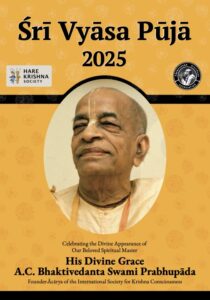SB 6.9.40 purport-
There are two kinds of devotees, known as sakāma and akāma. Pure devotees are akāma, whereas devotees in the upper planetary systems, such as the demigods, are called sakāma because they still want to enjoy material opulence. Because of their pious activities, the sakāma devotees are promoted to the higher planetary systems, but at heart they still desire to lord it over the material resources. The sakāma devotees are sometimes disturbed by the demons and Rākṣasas, but the Lord is so kind that He always saves them by appearing as an incarnation. The Lord’s incarnations are so powerful that Lord Vāmanadeva covered the entire universe with two steps and therefore had no place for His third step. The Lord is called Trivikrama because He showed His strength by delivering the entire universe with merely three steps.
The difference between sakāma and akāma devotees is that when sakāma devotees, like the demigods, fall into difficulty, they approach the Supreme Personality of Godhead for relief, whereas akāma devotees, even in the greatest danger, never disturb the Lord for material benefits. Even if an akāma devotee is suffering, he thinks this is due to his past impious activities and agrees to suffer the consequences. He never disturbs the Lord. Sakāma devotees immediately pray to the Lord as soon as they are in difficulty, but they are regarded as pious because they consider themselves fully dependent on the mercy of the Lord. As stated in Śrīmad-Bhāgavatam (10.14.8):
tat te ’nukampāṁ susamīkṣamāṇo bhuñjāna evātma-kṛtaṁ vipākam hṛd-vāg-vapurbhir vidadhan namas te jīveta yo mukti-pade sa dāya-bhāk
Even while suffering in the midst of difficulties, devotees simply offer their prayers and service more enthusiastically. In this way they become firmly fixed in devotional service and eligible to return home, back to Godhead, without a doubt. Sakāma devotees, of course, achieve from the Lord the results they desire from their prayers, but they do not immediately become fit to return to Godhead. It is to be noted herein that Lord Viṣṇu, in His various incarnations, is always the protector of His devotees. Śrīla Madhvācārya says: vividhaṁ bhāva-pātratvāt sarve viṣṇor vibhūtayaḥ. Kṛṣṇa is the original Personality of Godhead (kṛṣṇas tu bhagavān svayam). All the other incarnations proceed from Lord Viṣṇu.
SB 6.9.44 purport-
The Lord says in Bhagavad-gītā (7.15–16): na māṁ duṣkṛtino mūḍhāḥ prapadyante narādhamāḥ māyayāpahṛta-jñānā āsuraṁ bhāvam āśritāḥ catur-vidhā bhajante māṁ janāḥ sukṛtino ’rjuna ārto jijñāsur arthārthī jñānī ca bharatarṣabha
“Those miscreants who are grossly foolish, lowest among mankind, whose knowledge is stolen by illusion, and who partake of the atheistic nature of demons, do not surrender unto Me. O best among the Bhāratas [Arjuna], four kinds of pious men render devotional service unto Me—the distressed, the desirer of wealth, the inquisitive, and he who is searching for knowledge of the Absolute.”
The four classes of neophyte devotees who approach the Supreme Personality of Godhead to offer devotional service because of material motives are not pure devotees, but the advantage for such materialistic devotees is that they sometimes give up their material desires and become pure. When the demigods are utterly helpless, they approach the Supreme Personality of Godhead in grief and with tears in their eyes, praying to the Lord, and thus they become almost pure devotees, free from material desires. Admitting that they have forgotten pure devotional service because of extensive material opportunities, they fully surrender to the Lord, leaving to His consideration whether to maintain them or annihilate them. Such surrender is necessary. Bhaktivinoda Ṭhākura sings, mārabi rākhabi—yo icchā tohārā: “O Lord, I fully surrender unto Your lotus feet. Now, as You desire, You may protect me or annihilate me. You have the full right to do either.”
SB 6.9.45-O Lord, O supreme pure, You live within the core of everyone’s heart and observe all the desires and activities of the conditioned souls. O Supreme Personality of Godhead known as Lord Kṛṣṇa, Your reputation is bright and illuminating. You have no beginning, for You are the beginning of everything. This is understood by pure devotees because You are easily accessible to the pure and truthful. When the conditioned souls are liberated and sheltered at Your lotus feet after roving throughout the material world for many millions of years, they attain the highest success of life. Therefore, O Lord, O Supreme Personality of Godhead, we offer our respectful obeisances at Your lotus feet.
PURPORT-The demigods certainly wanted Lord Viṣṇu to relieve their anxiety, but now they directly approach Lord Kṛṣṇa, for although there is no difference between Lord Kṛṣṇa and Lord Viṣṇu, Kṛṣṇa descends to this planet in His Vāsudeva feature for the purpose of paritrāṇāya sādhūnāṁ vināśāya ca duṣkṛtām [Bg. 4.8]—protecting His devotees and annihilating the miscreants. Demons, or atheists, always disturb the demigods, or devotees, and therefore Kṛṣṇa descends to punish the atheists and demons and fulfill the desire of His devotees. Kṛṣṇa, being the original cause of everything, is the Supreme Person, above even Viṣṇu and Nārāyaṇa, although there is no difference between these different forms of the Lord. As explained in Brahma-saṁhitā (5.46):
Kṛṣṇa expands Himself as Viṣṇu the way a bright candle kindles another. Although there is no difference between the power of one candle and another, Kṛṣṇa is compared to the original candle. The word mṛṣṭa-yaśase is significant herein because Kṛṣṇa is always famous for relieving His devotee from danger. A devotee who has sacrificed everything for the service of Kṛṣṇa and whose only source of relief is the Lord is known as akiñcana.
SB 6.9.48 purport–
When the demigods finished offering their prayers, they anxiously waited for their enemy Vṛtrāsura to be killed. This means that the demigods are not pure devotees. Although without difficulty one can get anything he desires if the Lord is pleased, the demigods aspire for material profit by pleasing the Lord. The Lord wanted the demigods to pray for unalloyed devotional service, but instead they prayed for an opportunity to kill their enemy. This is the difference between a pure devotee and a devotee on the material platform. Indirectly, the Lord regretted that the demigods did not ask for pure devotional service.
Some Conclusions-Prabhupada clearly gives us the definition between those devotees who are completely pure and those still with material desire. This example is of the very pious demigods praying to Krsna to kill their enemy, the demon Vrtasura. Who among us would not pray to Krsna for relief in the midst of great difficulty? Those who are pure devotees.
One time Prabhupada told a story of when there was bombing from the Japanese on Calcutta. Everyone fled the city, except for a few, probably those who could not leave. Anyway, Prabhupada did not want to leave just because bombs were falling all around, and he told us he sat there and ate Krsna prasadam, while the bombs were falling, thinking Krnsa will protect him. He also was thinking this (bombing) was an exhibition of Krsnas external energy the Virata rupa in the form of devastation.
In verse 6.9.45 above this is stated within the verse….You have no beginning, for You are the beginning of everything. This is understood by pure devotees because You are easily accessible to the pure and truthful.
This reminds me of an earlier verse in SB which state….“Śrī Kṛṣṇa, the Personality of Godhead, who is the Paramātmā [Supersoul] in everyone’s heart and the benefactor of the truthful devotee, cleanses desire for material enjoyment from the heart of the devotee who relishes His messages, which are in themselves virtuous when properly heard and chanted.” (SB 1.2.17)
So to become pure is not an easy thing, but the process to be so, is given in Srimad Bhagavatam-one must be truthful and want to hear the messages of Godhead from the pure devotees.
Hare Krsna
damaghosa das
garden video of our 3 gardens for Govinda




